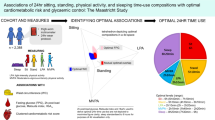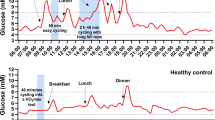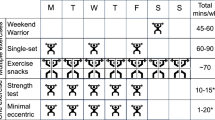Abstract
This study examines the effects of Ramadan fasting on various psycho-physiological measures during submaximal exercise, under real-world ecologically valid conditions. Eleven Muslim men performed a 30-min continuous running on a treadmill at intensity 65 % VO2max in the Ramadan fasted (RAM) and non-fasted (or Control, CON) state, on two separate occasions in a crossover and counter-balanced order. The amount of calories and fluid volume intake of participants’ last pre-exercise main meal, i.e., ~3–4 h prior to CON and ~10–12 h prior to RAM trial, were standardized. To simulate real world scenario, their 24 h pre-trial sleep hours and pattern were typical of the Ramadan and non-Ramadan period. There was no significant difference in total training load for the week prior to the RAM and CON exercise trials. Results showed no differences between RAM and CON trial for both carbohydrate and fat oxidation rate (both p > 0.05; effects size (d) = small and trivial, respectively). Blood glucose in RAM trial was lower at pre-exercise and higher at post-exercise than CON trial (both p < 0.05; d = moderate). Daytime sleepiness and moods state showed no differences between conditions (all p > 0.05; d = trivial). Heart rate throughout run (p = 0.03) and ratings of perceived exertion (p = 0.03, d = small) were higher in RAM. In conclusion, Ramadan fasting has no major impact on substrate utilization and is not an effective ‘fat-burning’ enhancing activity to lose fat mass. Running in the Ramadan fasted state led to a greater psycho-physiological stress compared to the same run in the non-fasted state.


Similar content being viewed by others
References
Maughan RJ, Fallah J, Coyle EF (2010) The effects of fasting on metabolism and performance. Br J Sports Med 44:490–494
Reilly T, Waterhouse J (2007) Altered sleep–wake cycles and food intake: the Ramadan model. Physiol Behav 90:219–228
Roky R, Houti I, Moussamih S, Qotbi S, Aadil N (2004) Physiological and chronological changes during Ramadan intermittent fasting. Ann Nutr Metab 48:296–303
Aziz AR, Png W (2008) Practical tips to exercise training during the Ramadan fasting month. ISN Bull 1:13–195
Al-Hourani HM, Atoum MF (2007) Body composition, nutrient intake and physical activity patterns in young women during Ramadan. Singap Med J 48:906–910
Bakhotmah BA (2011) The puzzle of self-reported weight gain in a month of fasting (Ramadan) among a cohort of Saudi families in Jeddah, Western Saudi Arabia. Nutr J 10:84–91
El Ati J, Beji C, Danguir J (1995) Increased fat oxidation during Ramadan fasting in healthy women: an adaptive mechanism for body-weight maintenance. Am J Clin Nutr 62:302–307
Chaouachi A, Chamari K, Roky R, Wong P, Mbazaa A, Bartagi Z, Amri M (2008) Lipid profiles of judo athletes during Ramadan. Int J Sports Med 29:282–288
Bouhlel E, Salhi Z, Bouhlel H, Mdella S, Amamou A, Zaouali M, Mercier J, Tabka Z, Zbidi A, Shephard RJ (2006) Effect of Ramadan fasting on fuel oxidation during exercise in trained male rugby players. Diabetes Metab 32:617–624
Stannard SR, Thompson MW (2008) The effect of participation in Ramadan on substrate selection during submaximal cycling exercise. J Sci Med Sports 11:510–517
Sweileh N, Schnitzler A, Hunter G, Davis B (1992) Body composition and energy metabolism in resting and exercising Muslims during Ramadan fast. J Sport Med Phys Fit 32:156–163
Guéye L, Seck D, Samb A, Cissé F, Camara K, Marthineaud JP (2003) Physiological adaptations to exercise during a short-term fasting. Scripta Med (Brno) 76:291–296
Ramadan J, Barac-Nieto M (2000) Cardio-respiratory responses to moderately heavy aerobic exercise during the Ramadan fasts. Saudi Med J 21:238–244
Ramadan J, Telahoun D, Al-Zaid NS, Barac-Nieto M (1999) Responses to exercise, fluid, and energy balances during Ramadan in sedentary and active males. Nutrition 15:735–739
Wahid MF, Aziz AR, Tian H-HR, Png W (1999) Effect of Ramadan fasting on selected physical performance measures. In: Programme and abstract book, Joint 4th Asia-Pacific Conference and 8th International Sports Science Conference, Kota Bahru, Kelantan, Malaysia, pp 76–77, 15th–17th July 1999
Waterhouse J, Alabed H, Edwards B, Thomas R (2009) Changes in sleep, mood and subjective and objective responses to physical performance during the daytime in Ramadan. Biol Rhythm Res 40:367–383
Güvenç A (2011) Effects of Ramadan fasting on body composition, aerobic performance and lactate, heart rate and perceptual responses in young soccer players. J Hum Kinet 29:79–91
Arkinstall MJ, Bruce CR, Clark SA, Rickards CA, Burke LM, Hawley JA (2004) Regulation of fuel metabolism by preexercise muscle glycogen content and exercise intensity. J Appl Physiol 97:2275–2283
Gollnick PD, Pernow B, Essen B, Jansson E, Saltin B (1981) Availability of glycogen and plasma FFA for substrate utilization in leg muscle of man during exercise. Clin Physiol 1:27–42
Hargreaves M (1997) Interactions between muscle glycogen and blood glucose during exercise. Exerc Sport Sci Rev 25:21–39
Herrera CP (2012) Total sleep time in Muslim football players is reduced during Ramadan: a pilot study on the standardized assessment of subjective sleep–wake patterns in athletes. J Sport Sci 30(Supp. 1):S85–S91
Waterhouse J (2010) Effects of Ramadan on physical performance: chronobiological considerations. Br J Sports Med 44:509–515
Stannard RS (2012) Ramadan and its effect on fuel selection during exercise and following exercise training. Asian J Sports Med 2:127–133
Mujika I, Chaouachi A, Chamari K (2010) Precompetition taper and nutritional strategies: special reference to training during Ramadan intermittent fast. Br J Sports Med 44:495–501
Roy J, Ooi CH, Singh R, Aziz AR, Chai WJ (2011) Self-generated coping strategies among Muslim athletes during Ramadan fasting. J Sport Sci Med 10:137–144
Kaida K, Takahashi M, Akerstedt T, Nakata A, Otsuka Y, Haratani T, Fukasawa K (2006) Validation of the Karolinska sleepiness scale against performance and EEG variables. Clin Neurophysiol 117:1574–1581
Terry PC, Lane AM, Lane HJ, Keohane L (1999) Development and validation of a mood measure for adolescents. J Sport Sci 17:861–872
Noble BJ, Borg GA, Jacobs I, Ceci R, Kaiser P (1983) A category-ratio perceived exertion scale: relationship to blood and muscle lactates and heart rate. Med Sci Sports Exerc 15:523–528
Foster C, Florhaug JA, Franklin J, Gottschall L, Hrovatin LA, Parker S, Doleshal P, Dodge C (2001) A new approach to monitoring exercise training. J Strength Cond Res 15:109–115
Jones AM, Doust JH (1996) A 1 % treadmill grade most accurately reflects the energetic cost of outdoor running. J Sport Sci 14:321–327
Jeukendrup AE, Wallis GA (2005) Measurement of substrate oxidation rate during exercise by means of gas exchange measurements. Int J Sports Med 26(Suppl 1):S28–S37
Hopkins WG (2002) Probabilities of clinical or practical significance. Sports Sci 6. http://sportsci.org/jour/0201/Statistical_vs_clinical.ppt
Coyle EF, Coggan AR, Hemmert MK, Lowe RC, Walter TJ (1985) Substrate usage during prolonged exercise following a preexercise meal. J Appl Physiol 59:429–433
Riley ML, Israel RG, Holbert D, Tapscott EB, Dohm GL (1988) Effect of carbohydrate ingestion on exercise endurance and metabolism after a 1-day fast. Int J Sports Med 9:320–324
Chenevière X, Malatesta D, Gojanovic B, Borrani F (2010) Differences in whole-body fat oxidation kinetics between cycling and running. Eur J Appl Physiol 109:1037–1045
Millet GP, Vleck VE, Bentley DJ (2009) Physiological differences between cycling and running. Lessons from triathletes. Sports Med 39:179–206
Khan A, Khattak MMAK (2002) Islamic fasting: an effective strategy for prevention and control of obesity. Pak J Nutr 1:185–187
Trabelsi K, el Abed K, Stannard SR, Jammoussi K, Zeghal KM, Hakim A (2012) Effects of fed- versus fasted-state aerobic training during Ramadan on body composition and some metabolic parameters in physically active men. Int J Sport Nutr Exerc Metab 22:11–18
Faye J, Fall A, Badji L, Cisse F, Stephan H, Tine P (2005) Effects of Ramadan fast on weight, performance and glycemia during training for resistance. Dakar Med 50:146–151 (In French: English abstract)
Guéye L, Samb A, Seck D, Cissé F, Marthineaud JP (2004) Influence of a 12 hours-fast on maximal exercise. Scripta Med (Brno) 77:5–8
Koubi HE, Desplanches D, Gabrielle C, Cottet-Emard JM, Sempore B, Favier RJ (1991) Exercise endurance and fuel utilization: a reevaluation of the effects of fasting. J Appl Physiol 70:1337–1343
Ba A, Samb A, Seck D, Kane MO, Seck MB, Sarr FB, Ciss M, Gueye L, Cisse F (2005) Comparative study of the effect of fasting during Ramadan on the glycaemia at rest in sportsmen and sedentaries. Dakar Med 50:22–25 (In French: English abstract)
Beneke R, Leithäuser RM, Ochentel O (2011) Blood lactate diagnostics in exercise testing and training. Int J Sports Physiol Perform 6:8–24
Bergman BC, Wolfel EE, Butterfield GE, Lopaschuk GD, Casazza GA, Brooks GA (1999) Active muscle and whole body kinetic after endurance training in men. Korean J Sport Sci 11:61–90
Leiper JB, Watson P, Evans G, Dvorak J (2008) Intensity of a training session during Ramadan in fasting and non-fasting Tunisian youth football players. J Sport Sci 26(Suppl 3):S71–S79
Coyle EF (2004) Fluid and fuel intake during exercise. J Sport Sci 22:39–55
Logan-Sprenger HM, Heigenhauser GJF, Killian KJ, Spriet LL (2012) Effects of dehydration during cycling on skeletal muscle metabolism in females. Med Sci Sports Exerc 44:1949–1957
Beedie CJ, Foad AJ (2009) The placebo effect in sports performance: a brief review. Sports Med 39:313–329
Larsson P (2003) Global positioning system and sport-specific testing. Sports Med 33:1093–1101
Conflict of interest
All authors declared no conflict of interest with the above work.
Author information
Authors and Affiliations
Corresponding author
Rights and permissions
About this article
Cite this article
Aziz, A.R., Png, W., Che Muhamed, A.M. et al. Effects of Ramadan fasting on substrate oxidation, physiological and perceptual responses during submaximal intensity running in active men. Sport Sci Health 10, 1–10 (2014). https://doi.org/10.1007/s11332-013-0163-8
Received:
Accepted:
Published:
Issue Date:
DOI: https://doi.org/10.1007/s11332-013-0163-8




